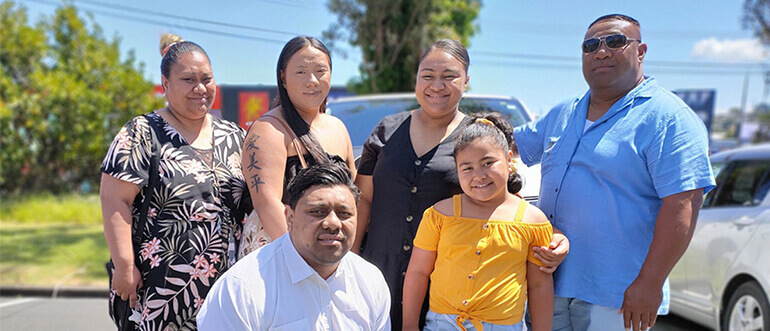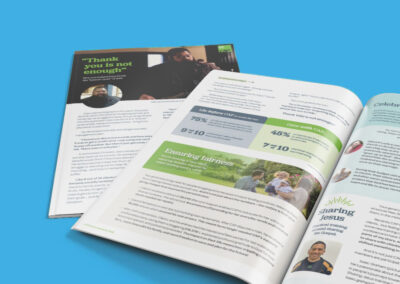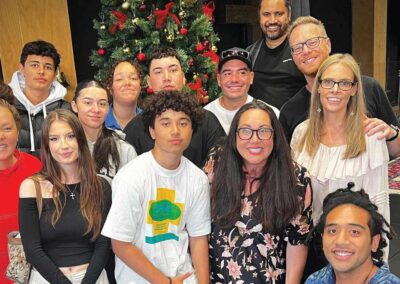Feeling isolated or lonely because of money problems?
When money is scarce it can cause us to shut-off the outside world.
Even when we’re attempting to prioritise family and friends, money-related stress can pressure us to start saying no to social occasions. We then begin to feel isolated – at a time when connecting with others is actually crucial to our overall wellbeing.
For CAP client Agnes, troubles with money were affecting her relationships, including the relationships that mattered to her the most – her tamariki (children) and her parents. Agnes remembers her kids entering the kitchen only to find an empty pantry.
Facing a mountain of loans and harassment from money lenders, Agnes still longed to ‘love-on’ her parents and to be generous with them. Agnes thrived in the kitchen. She loved making special kai (food) for her parents on a Sunday. But because she was broke, the tables were turned. Instead of showing manaakitanga (hospitality) to her parents, Agnes was forced to ask for her parents’ support with basics such as petrol or kids’ lunch money.
“I wasn’t able to be open with them about what was happening… I didn’t want to be a burden … It always saddened me because the other siblings would give, not us, because we just couldn’t afford it.”
Reaching out for free help
In a moment of desperation, Agnes spotted a brochure for CAP’s FREE Debt Help service and made a brave call for help. The friendly first responder explained the service and arranged for a CAP Debt Help Coach to visit her in the privacy of her home.
“At the end of that [call] was a prayer, she wanted to pray for our family and that. Oh, I just broke down.”
CAP’s involvement brought instant relief. Money lenders were asked to stop sending harassing texts emails and phone calls. Agnes and her husband, Ben, were given a new budget, ensuring that the cupboards were full again, and they were even able to start saving! As they started repaying their debts, the mental and physical stress began to ease too…
Pro tips for reconnecting with whānau and friends
My strength is not due to me alone, but due to the strength of many.
Human beings were made for relationship. The book of Genesis reminds us that we can’t thrive in isolation. Hauora, the Māori philosophy of health, explains that our wellbeing is made up of our mental health, the health of our family/social connections, physical health and spiritual health, and that all of these areas are connected. So when we experience money problems, it’s understandable that these difficulties can start to damage other aspects of our wellbeing.
The good news is that holistic wellbeing can be rebuilt – even when money is tight. To do this, you can be guided by the concept of Te Whare Tapa Whā, developed by Sir Mason Durie.
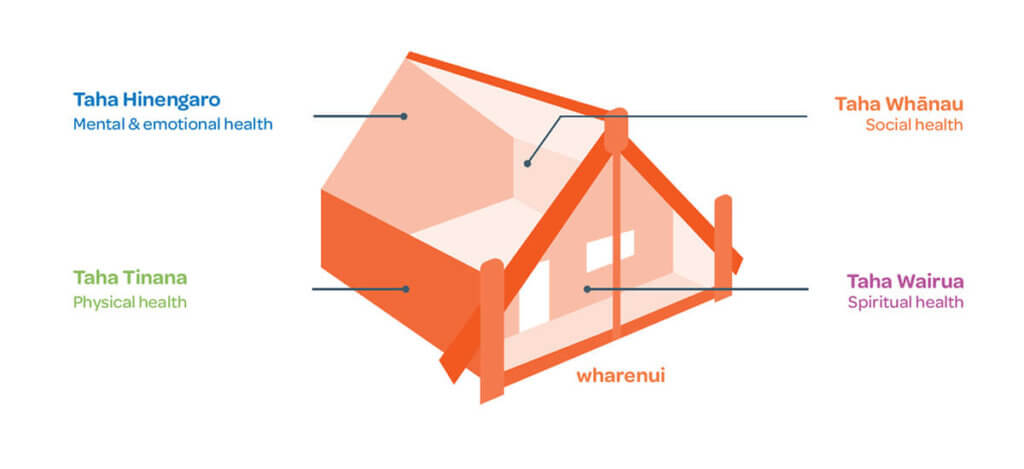
It takes four strong walls to hold up a house. In the same way there are four elements necessary for a healthy, balanced life.
The first wall – taha whānau – is social and family health. Taha whānau is about who makes you feel like you belong, who you care about and who you share your life with. The other three walls are mental and emotional health, physical health and spiritual health.
Tip 1: Rate where you’re at. How strong is your wall?
Before making any changes to your house, it pays to look at the strength of your walls. On a scale of one-to-ten, how healthy are your social or family relationships right now?

Remember: whatever your number – whether it’s a one or a nine out of ten – there are always ideas to get connected that don’t require money.
Agnes was lower on the scale than she wanted to be, but she had a vision of what she really wanted for the future. She didn’t yet know how to give her parents love/kai the way she wanted to, but she kept this goal alive.
“I always say to myself, one day Mama and Papa… one day!”
Dr Dougal Sutherland, a clinical psychologist at Victoria University, affirms that Te Whare Tapa Whā is a great reminder that we’re designed to live in community.
“To be a strong and stable human, we need … social connections. We are fundamentally made to be living in connection with each other… we’re social creatures.”
👉 Tip 2: Invest in quality relationships
The strength of your taha whānau – social and family health – is not necessarily about the number of relationships, but how you invest time to strengthen the quality of your relationships. Having 80 friends on Facebook – or even hundreds – doesn’t necessarily translate into meaningful, life-giving social relationships.
So rather than trying to maintain a large number of connections, take time to reflect on the people in your life that make you feel like you belong: Who could you open up to without needing to put on an act? It could be people in your workplace, people in your family, at church or at a club you belong to.
For Agnes, investing in the quality of her relationships translated to putting building blocks in place to show aroha to her parents, and re-connect with her tamariki (children).
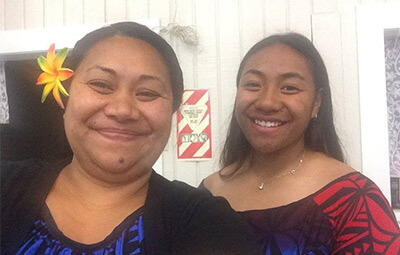
She says making time for her children is now an important part of maintaining her wellbeing. She’d love to remind others that it’s important – even in difficult times – to let your kids know that it’s still ‘all good’, and to remember that you’ve got each other.
“We have a connection now, especially with my older ones. I’m able to talk to them about the ‘before and after’ [of our CAP journey], and now we’re being blessed… just saying, ‘oh, how was work?’ and, ‘how was the day?’.”
👉 Tip 3: Dig deep and ‘act opposite’
If your finances are making you retreat from social occasions, don’t be hard on yourself – you’re not alone. Eight out of ten Debt Help clients say that being in debt kept them away from people – from friends, family, and social or sporting activities.
It’s important to be aware that the temptation to isolate ourselves is normal – and also to remember that you’re often your own harshest critic. Dr Sutherland says sometimes the pathway to wellbeing relies on you behaving in a way that’s opposite to the way that you feel.
“Your natural reaction is to withdraw and stay away from other people, and actually you need to act the opposite of that natural tendency and to seek out support even more than you have already have.”
Agnes reminds people in her community that ‘it’s okay to not be okay’. She acknowledges that money can be a real problem, but organisations like CAP can really help.
Don’t be whakama (embarrassed) about getting help. It actually takes real strength and bravery to reach out – and you are stronger than you think. Lean in to help and support, rather than leaning out.
As the book of Isaiah reminds us, you are not alone. “So do not fear, for I am with you; do not be dismayed, for I am your God. I will strengthen you and help you.” – Isaiah 41:10a
👉 Tip 4: Plan fun activities to do with the family or friends you’ve chosen to invest in
Now it’s time for some fun!
Money needn’t be a barrier: your mission is to think of things you love to do, then brainstorm some creative, cheaper alternatives. You’ll find there are plenty of family activities you can enjoy, even when you’re strapped for cash.
See some ideas from CAP client, Gemma, on how to find happiness when money is tight.
Spending less doesn’t mean sacrificing quality time with people you love. In fact, spending less can actually force you to think of creative ideas for connecting with friends and whānau in ways you’ve never tried.
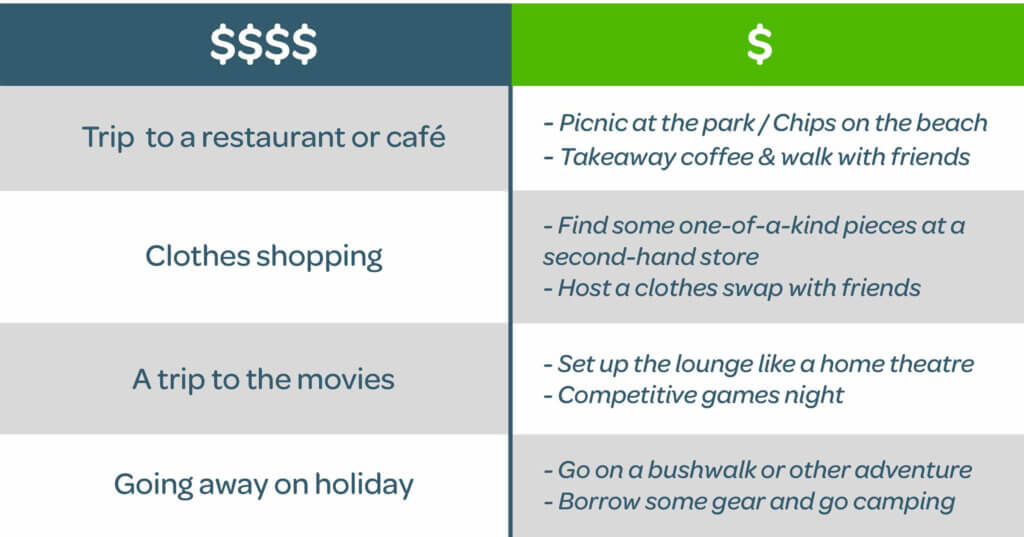
👉 Tip 5: Giving out is receiving
When you’re in a place of need yourself, it’s easy to forget about the support you can give to others. Dr Sutherland invites us to go against our instincts:
“When you’re giving out support to others it’s just as valuable, and does you just as well, psychologically than receiving it – in fact, probably even more! So actually, who can you help? There’s always somebody who may be struggling in your circles… How can you help? And in turn, it might give them permission to help you out too.”
And just as you don’t need money to enjoy quality time with your loved ones, you also don’t need money to be able to give.
One way Agnes extends manaakitanga is by volunteering at her local soup kitchen. You may discover similar opportunities to lend a hand at a local marae or local City Mission – especially around the times of special events and festivities.
“…Connecting with others that used to be in my place and hearing their stories… it’s just a good feeling giving back to the community – ‘cause, I swear that used to be me. I can give, knowing that families will be fed, knowing that the struggles are real.”
Other ways to serve in your community include getting involved in beach and river clean ups or working bees at local schools or community walls. Keep an eye out in your local paper or Facebook community page for opportunities.
You could also offer to help friends and whānau with errands, childcare or aged care, including cooking and delivering a meal, cleaning, or simply providing company to those who are frequently alone.
“The sun will shine again if you CAP it.”
Before coming to CAP, Agnes was stressed-out by court summons and debt collectors banging on her door. Her hauora (health) suffered – “from breakdowns [to] stress to sleepless nights”.
Her natural instinct was to shut herself away. But Agnes ‘acted opposite’ and made the brave move to call CAP for help – a move she wishes she made earlier.
“I think my mistake was leaving it too long and, you know, there’s help out there.”
Her advice to others who are struggling is that there is free wrap-around support and practical help to carry you through. “The sun will shine again if you CAP it. CAP will walk with you from the start of your struggles ‘til the finish line.”
Agnes reached her debt-free finish line just a few of months ago. Here’s the email she sent CAP:
We can now say “DEBT FREE” as of today! Whoop whoop cheehooo🎈💖👌. CAP… what can I say. Thank you for CAP supporters who helped, and prayed for us. I will never forget the day when my Debt Help coaches first visited. It was like angels coming to visit us to take a big toll off our shoulders.”
“My parents gave us the funny look, and asked ‘What’s going on?’“
Not only has Agnes learnt new money management skills, paid off her debts and kept her kitchen cupboard stocked, her social/family relationships have been strengthened – she’s been able to build the strength of her taha whānau. She’ll never forget the day she could finally fulfill her dream of blessing her parents with kai.
“The day that happened… the very first kai we made them, they – my parents – gave us the funny look and asked us, ‘What’s going on?’, I just said ‘God is good’. They love every meal we make them now. I know for sure… we are blessing our family. And I never ever have to ask for dosh anymore.”
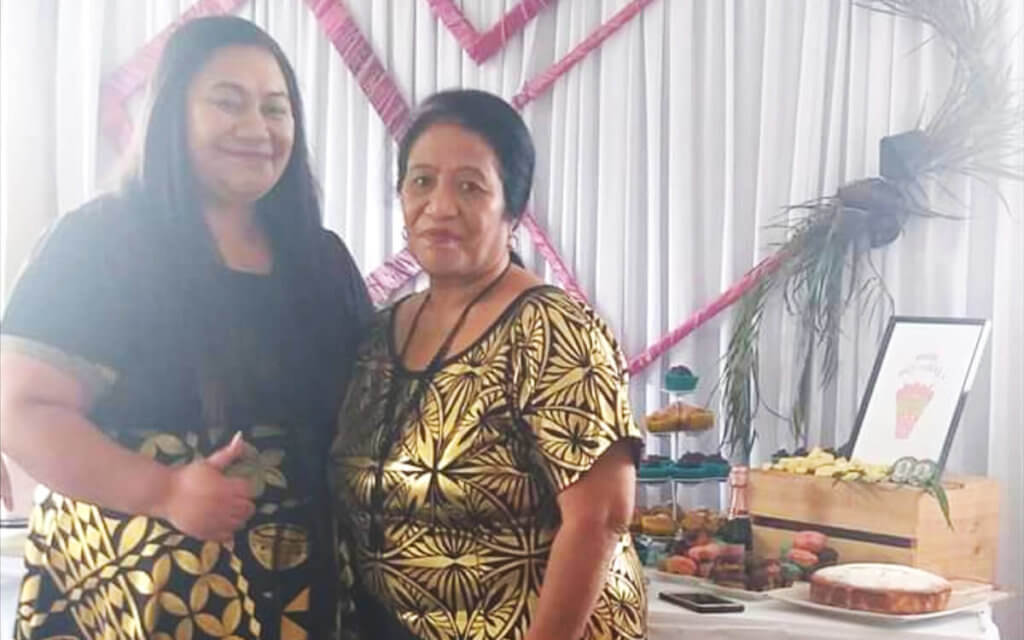
“It’s just amazing that I can do that with my mum… because she knows the struggle we have. She’s like, ‘I’m proud of you… you’ve made a difference, and that’s because you got up and you went and got help.’”
If you’d like to ensure that more New Zealanders in hardship receive the free holistic help they need, you can donate here.
